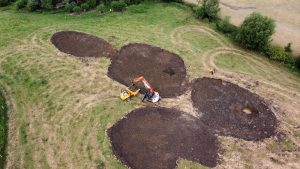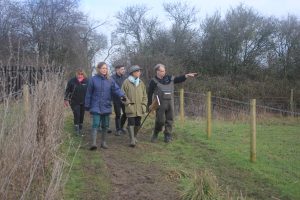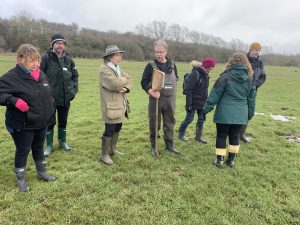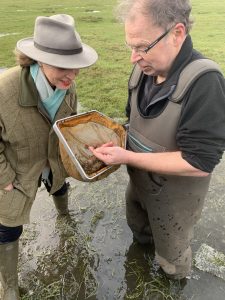Rebecca Pow MP visits new habitats at Manor Farm
1st February 2023
Last week, Rebecca Pow MP, Minister for Environmental Quality and Resilience, had the opportunity to see how recently created floodplain wetland mosaic habitat in Buckinghamshire is delivering high quality food alongside environmental protection and conservation enhancement.
The Minister visited Manor Farm in the village of Chearsley, run by organic farmer Rose Dale who has worked closely with The River Thame Conservation Trust (RTCT) and Freshwater Habitats Trust (with partnership funding from the Environment Agency) to carefully design and excavate a network of ponds across a field that is also used to graze cattle.
 New ponds have been created at Manor Farm as part of a wetland mosaic habitat.
New ponds have been created at Manor Farm as part of a wetland mosaic habitat.
The project has created a range of habitats which is enabling birds, plants and insects to thrive with the creation of a new “backwater” which connects to the adjacent River Thame, providing a refuge for fish and helping fish populations to become more resilient to floods, (which are increasing due to climate change). The creation of new floodplain ponds in turn provide opportunities for cattle to drink, and their low intensity trampling is helping a range of plants and insects to become established.
 Freshwater Habitats Trust CEO Jeremy Biggs (right) with Rebecca Pow MP and others at Manor Farm.
Freshwater Habitats Trust CEO Jeremy Biggs (right) with Rebecca Pow MP and others at Manor Farm.
In addition to providing a tour of the ‘floodplain wetland mosaic’ created by the new ponds, project partners had the opportunity to highlight to the Minister the importance of incorporating wildlife and water friendly measures into farming. They also shared how collaborative working between NGOs, government agencies, and local landowners through the Thame Catchment Partnership (co-hosted by River Thame Conservation Trust and Freshwater Habitat Trust), can create mutually-beneficial opportunities. Catchment partnerships are a forum where stakeholders can work collaboratively to address many complex and cross-cutting issues which rivers face. All were also keen to stress the importance of evolving agri-environment payments in ensuring farming can be delivered to enable the co-benefits of environmental protection and wildlife enhancement and welcomed last week’s announcement about the enhanced measures contained within Defra’s Sustainable Farming Incentive – one of the key strands of the evolving Environmental Land Management scheme (ELMs) agri-environment programme.
 David Fraser, CEO of the River Thame Conservation Trust said: “A key policy challenge for the Government is how to ensure food security, whilst also managing the land for environmental priorities such as net zero and flood risk alleviation and promoting nature conservation. River Thame Conservation Trust has a key role to play in identifying and facilitating such opportunities thus enabling local farms to be sustainable, as businesses and for the river and its catchment.”
David Fraser, CEO of the River Thame Conservation Trust said: “A key policy challenge for the Government is how to ensure food security, whilst also managing the land for environmental priorities such as net zero and flood risk alleviation and promoting nature conservation. River Thame Conservation Trust has a key role to play in identifying and facilitating such opportunities thus enabling local farms to be sustainable, as businesses and for the river and its catchment.”
Rose Dale, Owner of Manor Farm said: “ I run a 200-acre organic and regenerative farm in the heart of the beautiful Buckinghamshire countryside which produces beef and lamb for the local community. I believe that farming and agriculture should not and must not damage our precious planet but instead contribute positively by enhancing biodiversity, improving the health of our soils, the quality of the air that we breathe and the cleanliness of the water in our rivers and streams.
“This is why my livestock are only fed on grass and other plants that are grown on the farm and we do not use any chemicals such as pesticides or fertilisers. This is a more labour intensive way of farming with lower yields but these chemicals can be so damaging to the environment and contribute to climate change. All farmers need to become more sustainable and implement regenerative practices where they can so I am very grateful to The River Thame Conservation Trust and Freshwater Habitats Trust and of course to The Environment Agency for their support in helping to make this a reality on my farm. The Government must support farmers to make this transition.”

Professor Jeremy Biggs, CEO of Freshwater Habitats Trust said: “Freshwater Habitats Trust has identified Manor Farm as being in an Important Freshwater Area. These are the places we are focusing on as we develop the Freshwater Network – a national network of wilder, cleaner, connected habitats. Restoring the floodplains at Manor Farm is one of our very first steps in this vital strategy. Through initiatives like this and our Water Friendly Farming project, we are collaborating with farmers and other landowners across the country to create a network of clean water habitats to help reverse the long decline in freshwater wildlife.”
